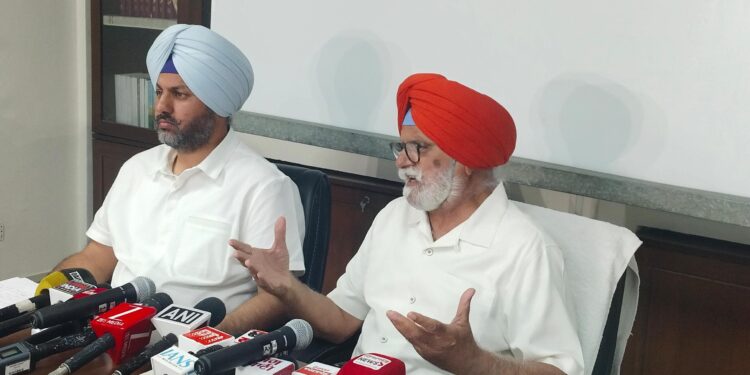Chandigarh September 10, 2025
MLAs from Kapurthala and Sultanpur Lodhi, Rana Gurjeet Singh and Rana Inder Partap Singh, today described the recent floods that devastated large parts of Punjab as a manmade disaster, asserting that residents—particularly farmers—have borne the brunt of administrative negligence.
Speaking to the media, the two legislators demanded adequate and unconditional compensation for all farmers, whether cultivators or landowners. Criticizing the Aam Aadmi Party (AAP) government’s decision to cap compensation at 5 acres, they questioned the rationale behind such a limitation. “Why has the government set a limit? Compensation should be provided for the entire loss suffered by farmers,” the MLAs insisted.
Highlighting inconsistencies in water release patterns from Punjab’s major reservoirs—Bhakra, Pong, and Ranjit Sagar dams—Rana Inder Partap Singh said the release of water in the past month was erratic and lacked logical justification. “If we examine the monthly discharge charts, it becomes clear that the flooding resulted from unplanned and unsystematic water releases. Flows would suddenly spike, then drop drastically within hours,” he noted.
The MLAs held both the state government, which manages the Ranjit Sagar Dam, and the Bhakra Beas Management Board (BBMB), under the control of the Government of India, accountable for the disaster. “The people of Punjab deserve answers,” they said, listing damages such as destroyed crops, submerged homes, lost wheat seed meant for the upcoming rabi season, swept-away household goods, and drowned milch animals.
Commenting on the compensation announced by Prime Minister Narendra Modi during his visit to flood-affected areas, Rana Gurjeet Singh said the Governor of Punjab had assured that this was just the beginning and that additional relief funds would follow. “We should take the Governor at his word,” he added.
Rana Gurjeet Singh estimated that at least 5 lakh acres of paddy have been damaged and called on the state government to supplement Central assistance. He proposed a compensation of ₹70,000 per acre, disbursed promptly, to help farmers rebuild homes, restore land, and repurchase livestock.
He also urged compensation for losses to village-based cottage industries such as sawmills, atta chakkis, dairies, and kohlus, as well as for damaged infrastructure, including link roads, dharamshalas, and dispensaries. “Compensation must go beyond crops. We need a comprehensive package that addresses the full scope of rural life affected by the floods,” he emphasized.
The MLAs also demanded that BBMB be held accountable for its role in the disaster. They suggested that while it may remain under central oversight, its operational control and management should be handed over to Punjab, with state engineers placed in its irrigation wing.“Punjab’s engineers have a better understanding of the region’s geography and the needs of its farmers,” they said.
Further, the legislators proposed the relocation of families living in flood-prone areas along the Sutlej, Beas, and Ravi rivers. They recommended a compensation of ₹50 lakh per acre to enable these families to rebuild in safer locations. They emphasized that agricultural labourers (khet mazdoors), who have also suffered immense losses, must not be overlooked in the compensation process.
The MLAs called for the construction of embankments at vulnerable points along riverbanks to prevent future breaches, noting that floods occurred in 2019, 2023, and again in 2025, indicating a pattern that demands urgent structural interventions.
They urged the formation of a team of engineers to design a mechanism for recharging Punjab’s depleting groundwater reserves using surplus floodwater. “Groundwater levels are falling by nearly one meter each year, and 80% of Punjab’s blocks are now critically overexploited. Sustainable water management must be treated as a national priority,” they stated.



